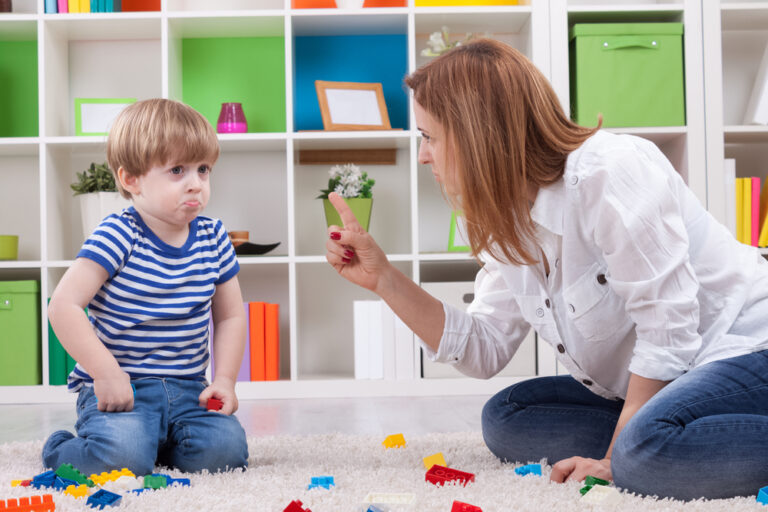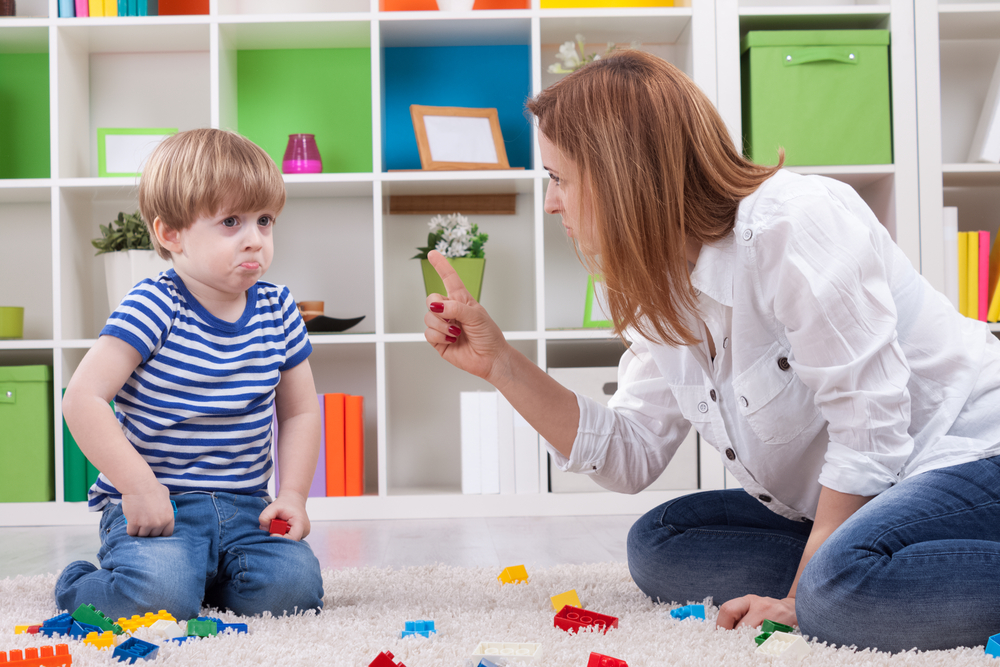We all lose our tempers at some point and when you are up against a toddler, there seems to be no winning. Thankfully, this does not need to be the case! Implementing active listening into your daily conversations is just one of the many ways that you can get your toddler to listen without yelling at them. It also helps with teaching your toddler empathy and the importance of attentiveness.
Here are the top methods to proactively motivate your toddler to cooperate before and when tensions flare and avoid a screaming match with your little one!
9 Steps to Prevent Yelling While Disciplining Your Toddler
#1 – Set Rules
Before your child has the chance to break a rule, make it known what is allowed and what is not. Having a clear-cut set of family rules helps to create structure, promotes safety, and teaches them self-discipline.
Here are some of the most basic rules that many parents apply at home and in life.
- Treat others the way you want to be treated — The golden rule teaches respect and gives a good reason for implementing it.
- Honesty is the best policy — Lying never gets you anywhere. Remind them that if they tell the truth, the consequences will be less than if they fib about what happened.
- Hold hands and look both ways when crossing the street — This is a solid piece of advice no matter what your age.
- Never talk to strangers — This is a hard lesson to explain. We want to encourage making new friends, but also guarantee their safety. Having open conversations about who they can trust and who could be dangerous is extremely important.
- Clean up after yourself — If you want a self-sufficient adult, this is a great rule to instill in your children. It not only teaches respect for others’ space, but it also promotes the need to not litter.
- Say that you are sorry when you do something wrong — Admitting a wrong can be hard for children and adults alike. Apologizing for wrongful actions teaches respect for others and their feelings.
- Ask permission first — We don’t take things that are not ours. We say “please” and “thank you”. This is another great lesson in respect.
These are just a few options to implement. As they are about to engage in certain activities where they could be tempted to cross a line, remember to remind them of these rules.
#2 – Implement Active Listening
This is a technique that can greatly enhance the communication between you and your child. Many times kids act out and tempers flare because they just want to feel seen and heard. Fully focusing on their frustrations and concerns can make them feel important and validated. By doing this, they will calm down more quickly, preventing you from becoming frustrated and yelling to get their attention.
So how do make sure that you are actively listening?
Remove Distractions When Your Toddler Starts Yelling
Children love attention and having a screaming fit with an audience is a great way to get mommy and daddy to cave. If you are in a noisy store or at the mall, find a quieter place to discuss the issue. If the TV is running or there is music playing, turn it off. Tell others to give you and your child a minute to have a conversation. This allows the focus to be solely on them and also ensures that all of their focus can remain on you, which prevents you from having to raise your voice at them.
Get Down to Their Level
Sit down at the table or kneel down on the floor to speak with them and not at them. Eye contact is key during active listening. In this instance, you are not the boss, you are a friendly ear to listen to the problem at hand. Furthermore, by physically getting closer to them, YOU are likely to be calmer and to speak at a normal level, compared to if you were towering above them.
Acknowledge Their Feelings
Tell your child that you understand their frustrations and ask them questions. This continues the conversation in a positive way and provides you with clear insight on how to proceed.
Improve Active Listening Skills to Prevent Yelling
When an argument or issue is not occurring, work on refining this technique. Playing games that teach this skill is one way to do this! Whether you want to play a game of telephone with family and friends or have your toddler help you in the kitchen with a recipe, find ways to relay information to your child and see if they can retain and relay that information back to you.
If they do a good job at this, praise them! By utilizing positive reinforcement, we will let them know that by paying attention, they will be rewarded. Over the long term, this method will become second nature, meaning less yelling and more listening when something goes wrong.
#3 – Give Them a Choice
A lot of times children just want to feel that they have control. Giving your toddler the power of decision making is one of the best methods to stopping and preventing a yelling match with your little one. By asking just one or two questions and providing them with options, you will cause them to pause and think about what they really want.
If you normally have trouble at dinner time, include them in the process. Do you want green beans or broccoli tonight? If it is bedtime where the struggle begins, ask whether they want a story or a song. Let them choose their pajamas. By including them in these daily activities, you not only get them to listen without yelling, but you also teach them the importance of cooperation, build their confidence, and strengthen their problem-solving skills.
Remember that too many options will lead to confusion and potentially another yelling match. You control what their choices are — limit them to two or three max. Furthermore, younger kids need a “one or the other” type choice, whereas a slightly older child may get the option of “well if you don’t want to go for a walk in the park, what do you want to do outside?” In this instance, you are giving them a little more power, but you are still dictating that this is an outside activity that we are choosing and not time in front of the TV.
#4 – Don’t Sweat the Small Stuff
We all want our kids to be perfect, well-behaved, clean, polite little angels at all times. We want them to understand what we are saying the first time we say it and we want them to pay attention when we need their focus. Unfortunately, this is not how children function. Not only that, but we as parents are not perfect either.
Having high expectations sets you up for failure and it can lead to you getting irritated quickly. In order to avoid a yelling match, it is important to center our focus on what is important and what is not. Are they being safe? Do they say please and thank you? Do they follow the rules of the house?
At some point, your toddler will get muddy or climb in the fountain at the mall or ask you the same question 8000 times. Try not to sweat the small stuff. If your child is not explicitly told NOT to do something, then they are likely just trying to explore this wonderful world we live in and that can be a little messy sometimes.
Try and remember that safety is the MOST important thing, followed by respect and empathy for others.
#5 – Make Punishments Known Ahead of Time
Knowing your fate can sometimes determine how you act. This is exceptionally true for children. Alerting your kids to the possible punishments for bad actions can make them think before they act and prevent you from yelling at them over something they didn’t actually know was a problem. This, of course, works better with older children, but the earlier you start the better.
Ages Two and Younger
This is the time that our little ones explore the world through touch and taste. In other words, EVERYTHING seems to go in their hands and mouths. This can sometimes be annoying and at other times dangerous. Therefore, introducing the word “no” into their vocabulary becomes very important.
However, keep in mind, that they don’t always know why what they are doing is causing you to become upset. It is important to explain the problem and the reason they need to stop engaging in that activity.
Once they start to reach the latter portion of this age range, timeouts can become effective if the behavior continues, but only for short periods of time. When they do something bad and a tantrum begins, tell them what they did and make them think about why it was bad for less than five minutes. Then come back and reinforce that if they do it again, then they get another timeout away from siblings and fun.
Ages Three to Five
This is your prime time to start teaching that bad behavior has consequences. All those funny moments in movies where kids are being little terrors — try and remember what they did. We have all seen or heard of the moment when a kid draws on the walls. Don’t give them the chance to do this. The first time you give them those crayons, explain that they are ONLY for paper and if they use them anywhere else, they will lose their favorite toy or won’t get dessert for a week.
This goes for any activity that could turn problematic quickly. This includes potty training. “Poopy needs to STAY in the potty. You get a reward for going in the potty and LEAVING it there.” Think ahead and explain consequences during the first encounter with a new task, game, or activity. This not only helps to prevent possible issues but allows you to mentally prepare for when they do occur.
Deal With Issues in a Calm and Collected Manner, Instead of Yelling
Toddlers unfortunately like to test us and the limits we set. The first time a problem happens, explain the issue. “We don’t pull our sister’s hair. That is mean and it hurts her. Next time if you want her attention, ask her to please listen.” Explain that the next time it happens, they will get a timeout.
If it happens again, which it likely will, ALWAYS follow through with the punishment, but explain it all over again. “No. I told you not to pull your sister’s hair. Remember that hurts and we don’t want to hurt sister. You need to go in a timeout for three minutes and think about what you did.”
Try and remember that in the beginning, this is a learning experience so never yell. Instead, explain what the problem is and why it needs to be handled differently. Ask if they understand and if they have any questions. Repeat the question after the punishment is complete. “Why should you not pull sissy’s hair?” If they respond correctly, commend them for learning something new! They have retained the information you gave them and positive reinforcement can help solidify good habits.
#6 – Be Consistent When Discipling Your Toddler
This can be one of the hardest parts of parenthood. No one wants to discipline their child. No one wants to be the bad guy. Unfortunately, part of being a good parent is being the disciplinarian and not a friend.
Always follow through with punishments — whether you are home, at grandma and grandpa’s house, or in the grocery store. After explaining the issue and the punishment that can follow the first time something occurs, there is no second or third strike. Predictability gives children structure and allows them to anticipate the results of their actions.
Knowing that their outcome will never falter if they disobey the rules will mean less bad behavior in the long run and less yelling back when they decide to test their limits.
#7 – Offer Rewards to Promote Good Behavior
What better way to enforce good behavior than a reward at the end of a job well done! Just like when training a dog, positive reinforcement is the best way to get your kids to behave. When a dog sits or stays they know that they will get a treat afterward. While this is a crude comparison, the basic method works.
Consider offering a yummy (and healthy) snack as a reward or playtime at the park! Maybe they get to pick the dessert tonight if they behave. Even words of encouragement and praise can lead to better behavior in the long run!
Negative reinforcement, like yelling or spanking, has actually been shown to cause behavioral issues as well as conditions like low self-esteem and depression. By instilling encouragement you are much more likely to achieve a productive outcome and limit any yelling that could otherwise arise.
#8 – Remember That Kids Are Sponges — If You Start Yelling, So Will They
Children absorb EVERYTHING we do and say. Even if you jokingly say things like “I hate you” or “you’re being stupid”, you are making an impression on your child that those types of words are okay to say. Even more so, when you yell at them, you can instill fear and solidify that yelling is how problems are solved.
As parents, we need to model good behavior. Using positive language, being respectful, saying please and thank you as well as not yelling when you are angry teaches them constructive methods of navigating situations that are not always in their favor.
#9 – Take Some Time to Yourself
Let’s be clear — many times frustration and yelling on our part occurs because of something completely other than the situation at hand. Whether it be a lack of sleep, stress at work, the fact that you skipped lunch, or that you are going CRAZY hearing “One potato, two potatoes, three potatoes, four” being sung over and over on the television — the culmination of factors can sometimes lead us to a breaking point.
One of the best methods to keeping a calm and collected attitude when disciplining our child is by just getting some good ole “me time.” Take turns with your spouse once or twice a week having one to two hours to yourself to detox and unwind from the stresses in your life. Watch your favorite program, have a glass of wine, or talk to a friend!
Getting a chance to de-stress not only helps improve your mental state, but it also ensures that when problems arise, you don’t lose your marbles on your little one!
FAQs about Getting Toddlers to Listen
Are there real issues that can cause my toddler to not listen?
Not all meltdowns are caused by an irrational reason. Sometimes your little one can just be overtired, overly hungry, feeling sick, or feeling confused. This can make listening a struggle because they are so focused on something else.
Before engaging with them, go through the list of reasons why they could be triggered.
- Hunger can get the best of all of us! If their eating schedule is off, offer them a snack or meal!
- Tummy trouble can also be a problem. Once you introduce solid foods into their diet, their pooping schedule can get off and this can lead to a very upset baby. If this is the case, try giving them water and foods that can help move the process along. Prunes, pears, and peaches are all tasty snacks that also work as constipation remedies!
- When you need 11 to 14 hours of sleep a day, it can be pretty easy to get behind if you get off schedule. Consider if nap time was short or skipped. It’s possible that your little one is just overly tired and needs some rest.
It is important to remember that children thrive off of schedules. Predictability is your friend when it comes to a toddler. Unknowns and changes from the norm can easily lead to a temper tantrum.
Are there other methods I can implement in our daily routine to help my toddler to improve their communication skills?
Yes! For young kids who are not speaking yet, sign language has been proven to be a great method to bridge the communication gap. As mentioned earlier, kids are like sponges, so teaching this skill is a lot easier when they are young than in their older years.
Moreover, dinner time is a great time for conversation. Once your child is old enough to speak, engage with them daily! Asking how their day was, what made them happy, what made them sad and just giving them a safe place to be open and honest to talk about their feelings is incredibly helpful not just in preventing yelling during frustrating times, but throughout their entire life.
Final Thoughts — Getting Your Toddler to Listen Without Yelling
Frustration happens to the best of us, especially when we have a toddler running around underfoot. Thankfully, there are many easy ways to limit issues that can arise and to make sure they end quickly and calmly when they do.
First and foremost, YOU need to stay calm. If this meltdown is coming at a bad time, breathe deeply and count to five. Then address the problem in a calm and collected voice.
Remember that you are a spectacular parent and even if the temper tantrum in the check-out line of the grocery store feels like a negative reflection on your parenting skills, you are dealing with something that every other parent has experienced and understands.
A fantastic first step is to teach your toddler that there are consequences to their actions when rules are broken, but the most important tool is active listening. When a problem occurs, we all want to be heard. Engaging in a positive and proactive manner with your child, no matter how irrational they are being, is a great way to ease the tension and teach them better coping methods for when something upsets them.







